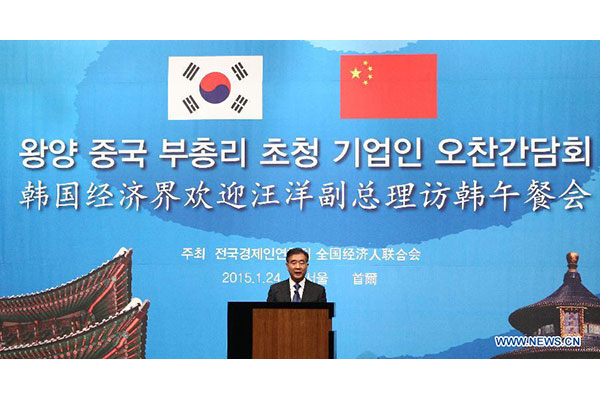
Vice-Premier Wang Yang delivers a keynote speech at a welcome luncheon held by South Korea’s economic circles in Seoul, South Korea, Jan 24, 2015. [Photo/Xinhua]
SEOUL — China and South Korea will have a as a result of closer bilateral political ties, strong will for cooperation of companies of the two countries as well as frequent people-to- people exchanges between the two peoples, visiting Vice-Premier Wang Yang said in Seoul on Jan 24.
Wang, who visited South Korea from Jan 22 to 24 at the invitation of South Korean government, told a luncheon party hosted by South Korean business community that fruitful outcomes had been achieved during his brief visit to the country which boosted the confidence for a bright prospect of economic and trade cooperation between the two countries.
As to the “new normal” of Chinese economic growth being discussed heatedly by the South Korean business circle, Wang said the “new normal” did not change the good fundamentals of the Chinese economy.
After 30 years of rapid growth, Chinese economy is now at a critical stage with emphasis on structural transformation and upgrading and will maintain a medium- and high-speed growth rate of around 7 percent, he added.
Under the “new normal”, China-South Korea economic ties would be enhanced, said the Chinese vice premier, expressing the hope that South Korean enterprises would adjust their investment policies and seize opportunities to realize sustainable development of economic and trade cooperation between the two countries.
In a keynote speech delivered at the China-South Korea economic and trade forum held here Friday, Wang said over past 23 years since China and South Korea established diplomatic relations, two- way trade has surged with an annual growth rate of 21 percent, approaching $300 billion last year.
Wang said Chinese and South Korean presidents’ announcement in Beijing last November of the conclusion of substantive negotiations on the China-South Korea free trade agreement (FTA) is an important milestone for bilateral economic and trade relations, and also a new bright spot in regional economic cooperation.
